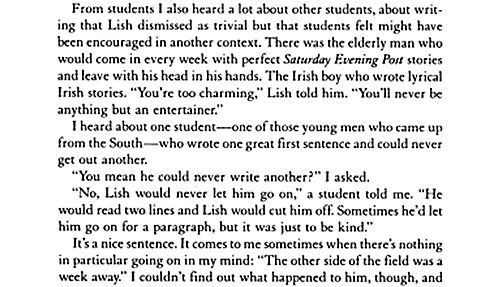Internet Histories | 12 November
The tactics of fiction, the US elections: schadenfreude and sympathy, patently ridiculous IP, condescending science writing, the Spotify blues and remembering Greg King
This fortnight:
Gordon Lish and the tactics of fiction | Liberal schadenfraude and the GOP's long con | Losing our boner for patents | When science journalism panders | Spotify and 'the good old days' | R.I.P Greg King
Rosabel
From the deep and dust-free online archives: Mimi Kramer's incredible profile of Gordon Lish from the October 1986 issue of Spy. She paints him as a fascinating and elusive sociopath; an abhorrent and charismatic talent. A demanding egoist: "a tireless name-dropper, given to opening his mail in class and boasting about the lengths to which people will go to get his attention." A man who had no qualms about abusing his power, but who did it openly, and with style.
Revolving around his Tactics of Fiction workshop, Kramer gathers insights from his past and then-current students:
It seems he was a marvellous and moody bully: intelligent, manipulative, cruel. But Lish was also a tireless champion for the writers he believed in, going beyond his role as editor. He created opportunities for them and went out of his way to promote them. He cultivated amongst his student a cult-like devotion and dependence, dispensing advice that was at once seductive and controlling. He sought a certain kind of writing: one that captured human ugliness and brutality.
Of course, Lish wasn't only a cruel teacher, he was a ruthless editor, most famous for his drastic editing of Raymond Carver's short stories - to the point where Carver sent an impassioned and panicked plea for Lish to stop production of What We Talk About When We Talk About Love:
Carver had been up all night reviewing Lish’s severe editorial cuts––two stories had been slashed by nearly seventy per cent, many by almost half; many descriptions and digressions were gone; endings had been truncated or rewritten––and he was unnerved to the point of desperation. A recovering alcoholic and a fragile spirit, Carver wrote that he was “confused, tired, paranoid, and afraid.” He feared exposure before his friends, who had read many of the stories in their earlier versions. If the book went forward, he said, he feared he might never write again; if he stopped it, he feared losing Lish’s love and friendship. And he feared, above all, a return to “those dark days,” not long before, when he was broken, defeated. “I’ll tell you the truth, my very sanity is on the line here,” he wrote to Lish.
It's a curiously invisible relationship, the one between a writer and their editor. Do relationships like this still exist today? I have no idea, but I suspect it's rare.
[caption id="attachment_5001" align="alignnone" width="500"] Banana Mania, #FAE7B5 - From Crayola Theory by Dawn Kim[/caption]
Oh, and I just really like these bananas.
Matt
A friend of mine recently commented that the US electoral system is heroin or crack for politics junkies the world over; returning to the garden-variety inanity of domestic politics is like coming down off some fabulous high, and who knows whether it’ll be as good the next time. As Americans get whipped into a democratic fervour (the NYT posits there’s something so profoundly American about chatting to your neighbours as you wait in line to vote; it’s kind of cute that they think so), so too does the rest of the world, and we all get lifted on a rising tide of electoral colleges and swing states and mumbled concession speeches.
Liberal schadenfreude peaked on Wednesday afternoon, as Obama was re-elected President and Republicans were left shocked, shaken and frequently sobbing. A blog was swiftly created to capture this angsty zeitgeist: White People Mourning Mitt Romney.
Canadian courts made a very interesting move this week by voiding Pfizer’s patent for Viagra in that country. While cheap boners are great for aberrant Canucks, I’m excited that this move might go some way to addressing a deadlier problem: that companies like Pfizer continue to make huge profits long after the development costs of the drugs they manufacture have been paid off, at the expense of human life. The current patent system is of little use for those dying of diseases that are curable except for medicine’s unaffordability; the recent issues with Herceptin in this country illustrate that even in nations with socialised healthcare, the price attached to certain drugs is responsible for the preventable deaths of thousands each year.
A counterpoint to this reformist moaning is a recent article in Wired, which argues – terribly – that the current patent system is both sensible and economical. It was written by the managing IP Attorney at IBM, one of the largest corporations in the world, and certainly an owner of one of the broadest IP portfolios; the comments down that bottom are pretty hilarious.
Finally, for an IP primer, I recommend checking out Part 4 of Kirby Ferguson’s excellent Everything’s A Remix mini-documentary, if you haven’t already. It’s way good.
Meanwhile, did you hear about the elephant last week who learnt to mimic certain Korean words? Every story I read on it – and I saw a few, because it was pretty inescapable – was written in the same sort of shonky, half-patronising way. I thought I was imagining things until I read this:
But what is particularly interesting here is the condescension in the language used to describe what a slime-mold does. What I describe as 'condescension' will of course be explained by others as an attempt to make the news fun, or kid-friendly, or something, but the fact remains that no one would think to describe the behavior of either a human being taking an IQ test or the behavior of gas molecules in a vacuum as if they were describing a diminutive cartoon character. In a PBS video about the slime-mold, we've already been told that this species has no brain, or nervous system, and presumably therefore no taste-buds; and yet we are expected to play along when the protein-carbohydrate blend it gets for performing its little trick is described as 'tasty'.
I get that making science accessible to a lay-audience is a difficult ask, and there’s no hard and fast rule about how much information to drown readers in. Writing stories with some internal consistency, and without resorting to Spongebob-esque squiggles might be a great place to start, though.
Joe
Between the Tea Party celebrity tweets, Matt's Tumblr link above, this guy's spectacular online meltdown and repudiation of every individual in his life who voted Democrat, and the gone-but-not-forgotten 'Christian Men's Defense Network' (self-actualising on behalf of the entire mens' rights movement, it ascribed Obama's victory to bringing out the 'slut vote') there was schadenfreude to burn for the rest of the world following the US elections this week. But lifting that veil for a second, what we have are a lot of very angry people who had been told in the days, hours, and minutes before their defeat that victory was assured, that there was no need to stop and critically reflect on their leadership or their values. Were this to happen to me - were I ever so comprehensively misled - I'd feel humiliated. Wouldn't you?
Meanwhile, among the American Left, many of whom where pessimistic in advance of November 6, there was a sort of reverse effect. All of this reinforces what I've personally believed for a long time: it's a lot better to wake up from a nightmare to things being okay than it is to wake up from getting what you want and face cold hard reality. The Atlantic's Conor Friedersdorf, who I found a sometimes-infuriating but ultimately invaluable source of gloom pre-election, agrees that self-professed American conservatives should be angry, but that it needs to be directed at the outlets who shopped them:
In conservative fantasy-land, Richard Nixon was a champion of ideological conservatism, tax cuts are the only way to raise revenue, adding neoconservatives to a foreign-policy team reassures American voters, Benghazi was a winning campaign issue, Clint Eastwood's convention speech was a brilliant triumph, and Obama's America is a place where black kids can beat up white kids with impunity. Most conservative pundits know better than this nonsense -- not that they speak up against it. They see criticizing their own side as a sign of disloyalty. I see a coalition that has lost all perspective, partly because there's no cost to broadcasting or publishing inane bullshit. In fact, it's often very profitable. A lot of cynical people have gotten rich broadcasting and publishing red meat for movement conservative consumption.
Rick Perlstein's Nixonland is one of the finest and most immersive history books I've ever read, and I've since set out to eagerly seek and devour anything else he writes. One of the eye-opening things about his writing on 1960s America is that he shows us principled and essentially well-meaning men and women on both the Democrat and Republican sides of the divide (as well as innumerable monsters), but it's clear from his writing on the present-day that those people have deserted the GOP. His article in the current issue of The Baffler, 'The Long Con', views the modern conservative psyche through a prism of the right-wing mailing lists Perlstein signs himself up to - their hoaxes, their hysterical rumours, and their miracle cures. When you read it alongside Friedersdorf's piece, an awful lot comes together, and it's clear that a lot of decent people who need panaceas (be it for their health, or for their loneliness, or their insecurities) have been swindled over the years by a political movement.
Writing for The New Yorker, Mike Spies becomes yet another music writer to bemoan the rise of music-streaming services like Spotify, an argument that basically boils down to:
...how else can you form a relationship with a record when you’re cursed with the knowledge that, just an easy click away, there might be something better, something crucial and cataclysmic? The tyranny of selection is the opposite of freedom. And the more you click, the more you enhance the disposability of your endeavor.
And I still just don't know about this line of thought, first popularised in Simon Reynolds' Retromania. I miss the real-life interaction of record stores and those strange little moments with mousy and mercurial clerks, and even the thrill of bringing home a new object, but I also feel like it's a real 'grumpy old man' syndrome that treats the decades of popular music that came before the Internet as somehow intractably permanent, that creates this false idea that we used to diligently give every record we heard the appropriate time of day.
Sure, the Internet is changing aspects of our behaviour, but in terms of our consumption of music, it merely exaggerates traits that were there before - that a cluster of trendsetters and hot-heeled followers get through as much as they can as soon as possible (and can now get through more, for less) while a long, long tail of casual listeners will have the same relationship with pop music as ever - a slow canon - and shall continue to access their regular go-tos with an unprecedented ease. The other thing I think all of these thinkpieces miss is that there's a singularity we ain't hitting anytime soon - specifically, that we can really only listen to one piece of music at once.
On the actual Spotify economy (specifically, what this all means for musicians) a lot of bullshit is called out in this video post by the redoubtable Chris Ott of Shallow Rewards:
Lastly: plenty has been said about the remarkable life and devastating passing of NZ criminal defence lawyer Greg King - I'll only add that the three of us were privileged to meet him at a Wintec journalism lunch in August of this year and that he was garrulous, thoughtful, friendly and kind. I was also lucky enough to interview him in 2010 for a feature on the repeal of the provocation defence for Kate - you can read it here, though I'd rather you did so to see how a man who by all accounts worked 24/7 took the time to give the same long and considered answers to a student magazine that many professionals wouldn't give to a major newspaper. Thanks, Greg.












